By Sarah Kathryn Stephens (10/18/1881 – 03/04/1968)
These recollections were put to paper by Patricia A. Kelley. She writes: “Sarah Kathryn Stephens probably wrote this in the 1950s. She used to tell Jane and I funny stories that happened when she was growing up, and I asked her to record some of them.”
The recollections were forward to the Pulaski County Historical Society by James McFadden in 2019. He asked that we also credit Charles (Bud) and Rita McFadden. If the estimate is correct and this was written in the 1950s, when she says, “changes that have taken place in the past sixty years,” Ms. Stephens is aiming her writing to the 1890s.
Her Story Begins
As James Whitcomb Riley said:
Thinkin’ back’s a thing that grows
On a feller, I suppose;
Older ‘at he gets, I jack
More he keeps a thinkin’ back.
And when I think of the changes that have taken place in the past sixty years, it is hard to believe we are living in the same world. With all our modern ways of the day I am wondering if there is as much happiness as in years gone by. I will try to describe country life, as I knew it.
Spring Unfolds In All Her Beauty
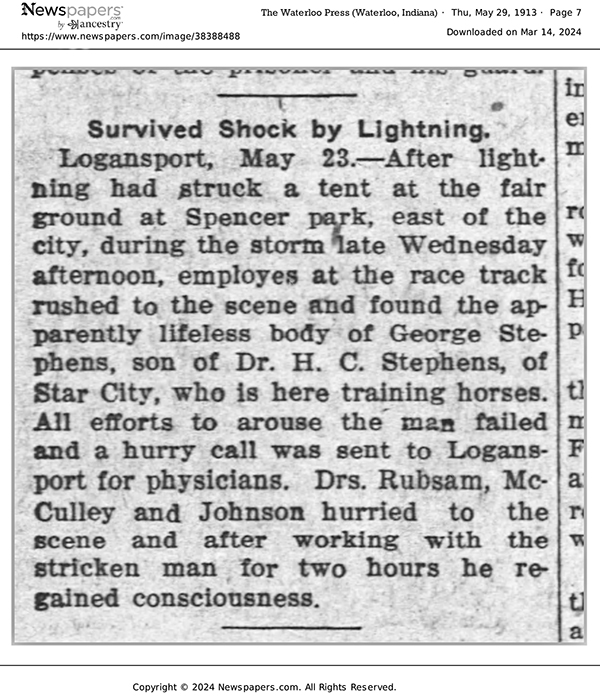 After a long and stormy winter, Spring unfolds in all her beauty. There is magic in the air. A little sun, a little rain, and God’s world is a world of life and beauty, blossoms on every bough. The streams rush along melting the snow and giving life as they roll merrily along. The woods, God’s own garden of paradise, are carpeted with the first spring flowers, great beds of moss, Blue Bells, Johnnies, Trillium, large blue Sand Violets, Jack in the Pulpit, and various flowers of all colors. The trees with their new dress, the red bud tree with its scarlet hues, and the tulip tree laden with yellow green tulips, and the queen of the woods, the Dogwood in all her majestic beauty, a solid mass of white blossom.
After a long and stormy winter, Spring unfolds in all her beauty. There is magic in the air. A little sun, a little rain, and God’s world is a world of life and beauty, blossoms on every bough. The streams rush along melting the snow and giving life as they roll merrily along. The woods, God’s own garden of paradise, are carpeted with the first spring flowers, great beds of moss, Blue Bells, Johnnies, Trillium, large blue Sand Violets, Jack in the Pulpit, and various flowers of all colors. The trees with their new dress, the red bud tree with its scarlet hues, and the tulip tree laden with yellow green tulips, and the queen of the woods, the Dogwood in all her majestic beauty, a solid mass of white blossom.
What a joy to be awakened at daybreak with the sweetest music ever heard as the woods are filled with songs as the birds come back to next and bring joy and new life. Or better still, get up early to be in the woods when the sun comes up – to see as well as hear the birds. The call of the Bob-White, the Meadow Lark, the Brown Thrush who builds her next so low to the ground in a clump of bushes reflects her confidence in a power of protection. The Robins, who next so close to the house, also the Cat Bird, drab in color but makes up for it in voice; the Flicker who builds in the hollow of a tree stump. The Orioles who weave long nests that hang from a high branch. The Cardinal, the brightest colored of all, and the darling little Jenny Wren who is so tiny, nests close to the homes, seemingly for protection. All join together as the mating season is the happy season, and they give forth with such music to awaken you around 3 A.M.
How many people miss the great joy country folks have in preparing the soil, planting the seeds, and gathering the fruits thereof. The greatest joy of life is a creative work, or a work of service such as the old country doctors gave. Of such service I would like to tell – his love of people and especially of children. As it has been said, “He who gives a child a treat makes joy bells ring in Heaven’s street.” Children bring happiness into any person’s life that opens the door of their heart to them; for children are God’s ambassadors, given to us to bring love, hope and peace.
A Country Doctor
 In 1885, my father, a country doctor, (Henry Clay Stephens) (1854-1924) started his life of service with only a year’s schooling at Curtis Physic-Medical College at Marion, Indiana. He was given his diploma and set up his office at Star City, Indiana, where he served for forty years. We moved from a farm west of Winamac (Indiana). There were four small children, Della, George, Kathryn and Billie. Children were his greatest joy and how they returned this love. With so little to work with, not even a modern office or equipment, with only the help and guidance of God could he have accomplished what he did. Never refusing to go when someone was suffering, even if he knew he wouldn’t get any pay so far as money was concerned. The people were hard working and honest but did not have much to pay their bills with, and the doctor was usually the last to be paid. So many times, he was paid in produce from the farm. In the fall there was enough sour apple butter and sorghum molasses to paint the house inside and out if it could have been used for that purpose. Sometimes a load of wood or hay, fresh meat when they butchered, and one time I remember a cow was given in payment.
In 1885, my father, a country doctor, (Henry Clay Stephens) (1854-1924) started his life of service with only a year’s schooling at Curtis Physic-Medical College at Marion, Indiana. He was given his diploma and set up his office at Star City, Indiana, where he served for forty years. We moved from a farm west of Winamac (Indiana). There were four small children, Della, George, Kathryn and Billie. Children were his greatest joy and how they returned this love. With so little to work with, not even a modern office or equipment, with only the help and guidance of God could he have accomplished what he did. Never refusing to go when someone was suffering, even if he knew he wouldn’t get any pay so far as money was concerned. The people were hard working and honest but did not have much to pay their bills with, and the doctor was usually the last to be paid. So many times, he was paid in produce from the farm. In the fall there was enough sour apple butter and sorghum molasses to paint the house inside and out if it could have been used for that purpose. Sometimes a load of wood or hay, fresh meat when they butchered, and one time I remember a cow was given in payment.
My mother was away, and we children tried to do the milking. We had saved so much cream we didn’t know just what to do with it. One sister wanted to throw it out, but another said, “Let’s borrow a churn and make some butter.” We salvaged two pounds of fresh butter. The family had grown to seven. Frank, Edna and Ab had joined the flock, and everyone worked as soon as they were old enough. Sometimes without pay, as father would say, “You must not charge them for they are having a hard time.” One time father came in and said to me, “I want to take you out to the country to stay with Aunt Ann, (as she was known) who is sick and needs help.” I was only twelve years old and did not like the idea, but whatever father said we knew was law, and on the way out there he told me what I was to do. I was to see that she had something to eat and give her medicine at the proper time. This old farmhouse was a two story house with green shutters on all windows which were kept closed most all of the time, which gave it the appearance of a deserted house. The tall dark pine trees surrounding the house, with the wind whistling through them, was not a very bright picture for a twelve-year-old girl, but I stayed two weeks. I had to take a little coal oil lamp and go up squeaky stairs at night to sleep alone. Needless to say, I was scared. The only thing that helped me was a very kind lady who lived just across the road. She would come over often and was good company for me. The only pay I received was a large, stemmed glass dish this lady gave me. I was very happy when Aunt Ann was able to be up so I could go home.
One night a mother gave birth to twins. Her husband was sick and there were two other small children, so I went to stay all night with them. Such a night, waiting on the sick father as well as the mother. The babies cried most of the night, so I walked the floor with a baby in each arm. We had wired to Chicago for a nurse, who arrived the next day to take over. My mother would often go along and help n the delivery of the babies, and we girls would go and nurse the sick as there were no nurses to be had. We often wonder just how many hundred babies father delivered, as in the early days of his practice there were no records kept, but he made one good record – he never lost but one mother.
A Blended Family
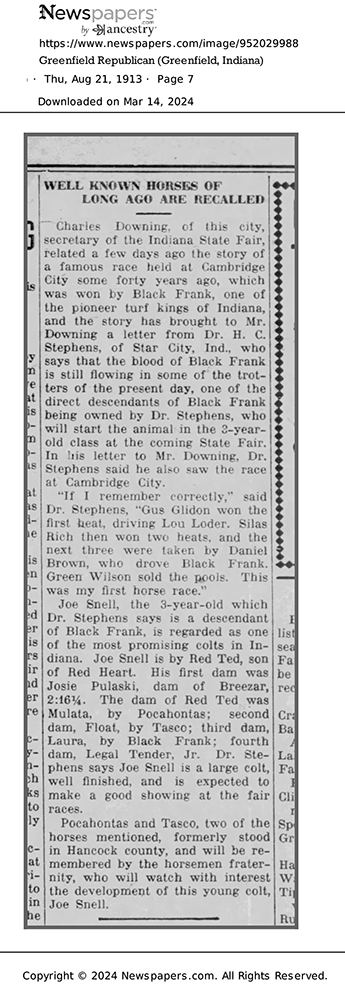 Our grandparents came to live with us, as grandmother had tuberculosis. Mother cared for her along with all her duties of caring for the family. I remember sitting by grandmother’s bed and fanning her, as it was hard for her to breathe. After she passed away, all the bedding, even the featherbed and pillows, had to be washed and a general cleaning was undertaken. Then, a couple of years later, a nephew of father’s, also a doctor, was stricken with tuberculosis, and since he had no place to go, he also was taken in and cared for until he passed on. All of this was done without any pay, and none of us were able to make a dollar except father, as we children were all in school. God seemed to protect us, as not one of us contracted the tuberculosis.
Our grandparents came to live with us, as grandmother had tuberculosis. Mother cared for her along with all her duties of caring for the family. I remember sitting by grandmother’s bed and fanning her, as it was hard for her to breathe. After she passed away, all the bedding, even the featherbed and pillows, had to be washed and a general cleaning was undertaken. Then, a couple of years later, a nephew of father’s, also a doctor, was stricken with tuberculosis, and since he had no place to go, he also was taken in and cared for until he passed on. All of this was done without any pay, and none of us were able to make a dollar except father, as we children were all in school. God seemed to protect us, as not one of us contracted the tuberculosis.
Grandfather lived with us about sixteen years. He was able to help take care of the horses and do odd chores. Then, as the boys grew up, they took turns in helping care for the horses and often did the driving for night calls. In the wintertime when the snow was deep and drifted, they drove two horses and many times they would be unable to get through the drifts. They had to unhitch the horses, take down a fence, pull the buggy over a ditch and go through fields to get to the sick people, or he rode horseback. They used a foot warmer of heated charcoal bricks in a metal casing or box, which was placed under the heavy fur robes. They also wore fur coats and caps with earmuffs. Everyone helped. If there was an operation, someone had to help with the anesthetic. Our home was near the office and the instruments were sterilized at the house where we had a large kitchen range with a big reservoir full of hot water.
One day a call came to have things ready for an emergency operation as they were bringing in a boy who had his hand mashed in a corn shredder. The arm had to be amputated above the elbow. This was done with the help of my brothers and myself. All the time the office was full of people milling around, telling their experiences and asking questions. Even so, the operation was a success, and by spring the boy was wearing his false arm.
Another time a young girl had her hand mashed in a sorghum press. It was several miles to her house. By the time father could get there, by horse and buggy, the girl was in bad shape. The girl’s mother asked father not to amputate the hand, and father said since it was cool weather he would try and see what could be done. All that winter they brought the girl to our house and father dressed her hand. As the fingers died and turned black, they were nipped off, so in that way he was able to save the hand with the thumb and the first two fingers.
People often came from a great distance for treatment and had no place to stay, so they were always taken in our home and cared for with no charge for room and board. A man was treated for cancer, and he stayed in the office and slept on the operating chair, as he could not lie down. The cancer was on the jawbone and hung down in the throat. He could only swallow liquids. A friend of father’s had a liniment he thought would cure cancer but couldn’t use it since he was not a doctor. The sick man was willing to have it tried on him. It was an experiment and was used hypodermically. It 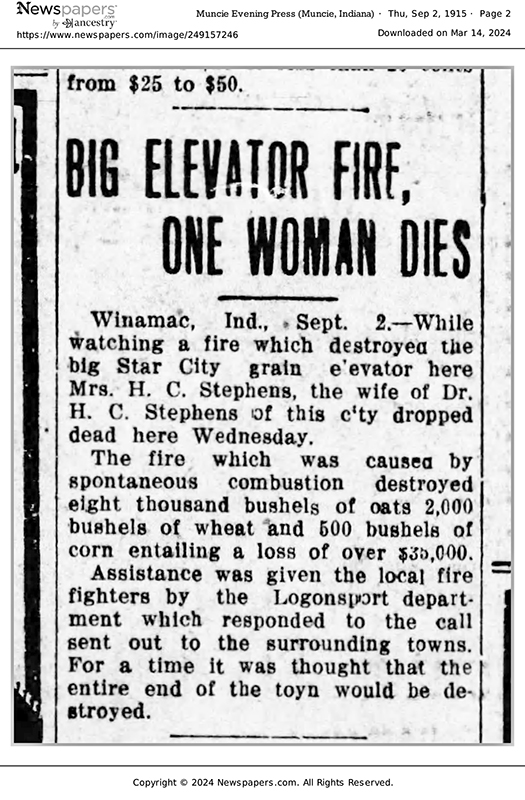 seemed to draw and burn the cancer out. After three weeks of treatment, father tied a silk cord around it and pulled it out roots and all. You never saw such a happy man, but father never received a penny for his services, only the satisfaction of helping someone.
seemed to draw and burn the cancer out. After three weeks of treatment, father tied a silk cord around it and pulled it out roots and all. You never saw such a happy man, but father never received a penny for his services, only the satisfaction of helping someone.
Father had so many wonderful remedies. He saved hundreds of children’s lives that had the croup by using a tea made by steeping [diaphoretic] powder. He also had a chest cold remedy and a cough syrup. I am sure we made barrels of it. Mothers said they couldn’t get along without it. I wonder sometimes why they are not used today.
The Doctor and Children
How he loved children and always said they are the truest friends we can have. They returned his love in so many ways. They would follow him around and go to the country with him. He gave them money if he had any, to buy candy or crackerjack. One day a bunch of children were playing in front of the office where father was trying to read his paper. One little girl kept jumping up and down and singing, “I got a nickel, I got a nickel,” and one of the other children said, “Where is it?” The girl answered, “In Doc’s pocket.” Of course, she got the nickel and off they went to buy candy.
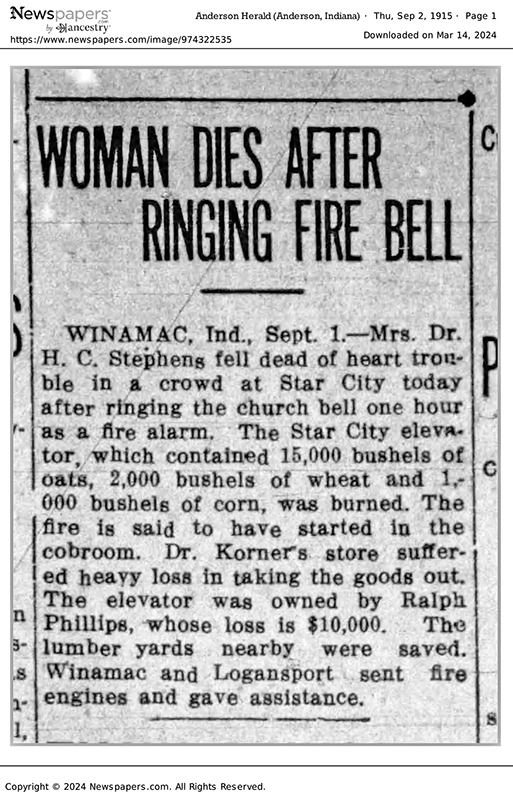 Another time, father was caring for a little boy while his father went shopping. When the father got back the little boy was sitting in the buggy (as father often kept the horse and buggy ready to go in front of the office) eating crackerjack. Father said, “Well, I believe in giving them what they want,” and the little boy piped up and said, “All right, I’ll just take this horse and buggy!”
Another time, father was caring for a little boy while his father went shopping. When the father got back the little boy was sitting in the buggy (as father often kept the horse and buggy ready to go in front of the office) eating crackerjack. Father said, “Well, I believe in giving them what they want,” and the little boy piped up and said, “All right, I’ll just take this horse and buggy!”
One time I went with father to take some children to the circus. He had bought them so many things and his granddaughter (Kathryn) wanted one of the little donkeys. So, on the way home she kept saying, “I just wish I had one of those donkeys,” and father said, “Oh! You wouldn’t want a donkey, they have such long ugly ears,” and she said, “but they have such cute little tails.”
One day he was feeding some pigs he had taken on a doctor bill. He had them in a pen by the barn. He came down the alley and noticed someone had thrown out too much corn, and he saw the children playing nearby, one of the grandchildren with them. He said, “Mamie, I wonder how all that corn got out to the pigs?” and she answered, “Well, Grandpa, I ‘des ‘spect day hopped up there and frowed it out themselves.” He laughed and said, “I guess maybe they did.”
Two little girls aways decorated father’s office whenever it was time to display the flag, such as the Fourth of July or Decoration Day. There was a little street waif the bigger boys always picked upon, and he would run to father’s office for protection. Of course, father always took care of him when he was sick. He would say, “Doctor, I love you better than anyone. I love you better 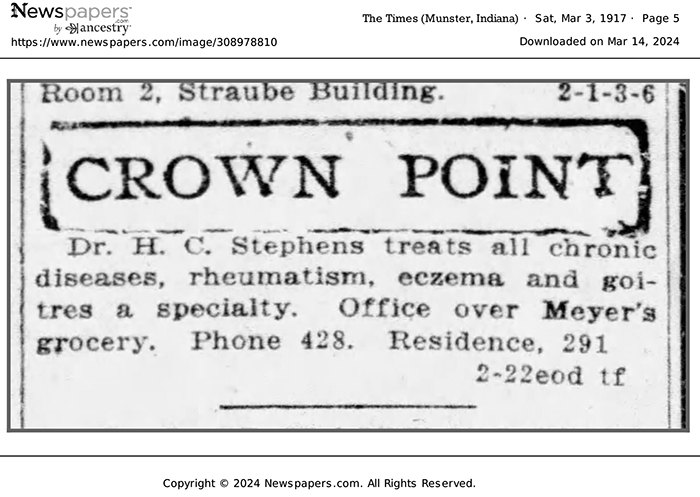 than my poor Ma.” One day he came to the office crying and father said, “Toots, what is the trouble?” With tears streaming down his face, he said, “You know, Doctor, I always told you I loved you better than anyone, but I went to Sunday School today and they told me I had to love Jesus best, but you are next.”
than my poor Ma.” One day he came to the office crying and father said, “Toots, what is the trouble?” With tears streaming down his face, he said, “You know, Doctor, I always told you I loved you better than anyone, but I went to Sunday School today and they told me I had to love Jesus best, but you are next.”
One day there was a bunch of men sitting on a bench in front of the grocery store. Toots came along and as they knew he just idolized father, they started saying all the mean things they could about him, just to see what Toots would say. He was wearing one of father’s old hats, and smoking a cigar stub he had picked up. He tried to defend father, but the men were getting the best of him, so he walked back and forth in front of them a few times, trying to think of a compliment he could give. Finally, he walked up to them and said, “I know Doc is a good man. He was born in the same town with Jesus Christ.”
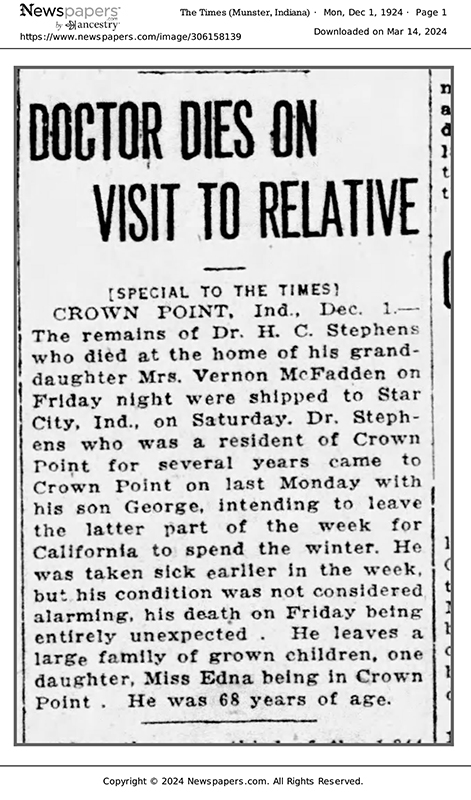 When Toots started to school, they were getting ready to celebrate George Washington’s birthday, and the teacher was telling them how George Washington died. As soon as school was out Toots ran as fast as he could and was all out of breath when he got to father’s office and said, “Oh my God, Doc, did you know that George Washington was dead?”
When Toots started to school, they were getting ready to celebrate George Washington’s birthday, and the teacher was telling them how George Washington died. As soon as school was out Toots ran as fast as he could and was all out of breath when he got to father’s office and said, “Oh my God, Doc, did you know that George Washington was dead?”
Father would stay all night with children who were dangerously sick. He would let the mother go to bed while he took care of the sick ones. Just his presence seemed to make them better. He lost so much sleep sometimes he would go to sleep in the buggy and the horses would run away with him.
One little boy had a crippled hip, a tubercular bone. It was hard for him to sit on the hard seats at school. His people lived in the country, and father told him that any time he suffered to come to the office and lie down. Sometimes when father would be out on a call, Harry would be there waiting when he came back. Many times, father would bring him home and keep him all night. He would sleep with Harry to try and study his case to see what he could do for him. Father was heartbroken when all his efforts failed. I have seen him walk the floor and cry when he had a bad patient and he didn’t know what to do.
The Doctor and the Ways He Served
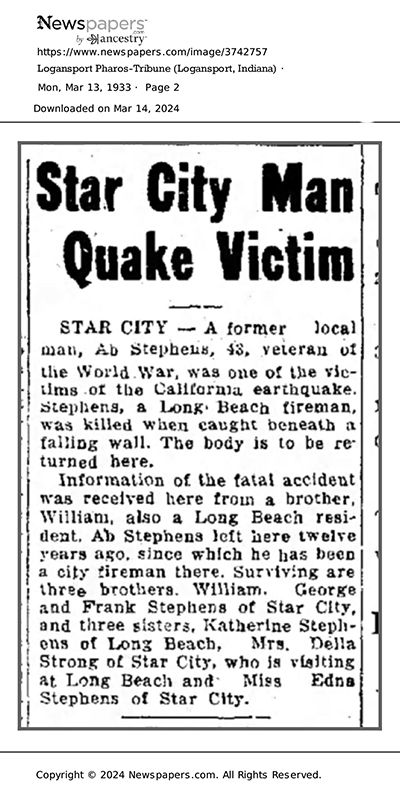 One time there were some cases of smallpox. One family had several children and not much to live on. After they were over the smallpox father thought they should burn their old carpet and some of the bedclothes. He stopped in at the store and asked what it would cost to buy a new carpet. The merchant said he would let them have it at cost, so father headed the list with ten dollars and then went down to the drug store, where the men met around the stove. Father told them what he was trying to do and asked if any of them would like to help. One old, retired farmer grinned and said, “Well, if I made my money as easy as you do I would give ten dollars too.” Father said, “Well, if you will go with me on my next visit I’ll give you ten dollars.” “Oh,” he said, “I wouldn’t do that.” Father said, “Then it isn’t so easy.”
One time there were some cases of smallpox. One family had several children and not much to live on. After they were over the smallpox father thought they should burn their old carpet and some of the bedclothes. He stopped in at the store and asked what it would cost to buy a new carpet. The merchant said he would let them have it at cost, so father headed the list with ten dollars and then went down to the drug store, where the men met around the stove. Father told them what he was trying to do and asked if any of them would like to help. One old, retired farmer grinned and said, “Well, if I made my money as easy as you do I would give ten dollars too.” Father said, “Well, if you will go with me on my next visit I’ll give you ten dollars.” “Oh,” he said, “I wouldn’t do that.” Father said, “Then it isn’t so easy.”
Early one morning there was a call to come to the office. There had been an auto accident, and a lady was badly hurt. She was unconscious and as he worked with her she began to regain consciousness. He had some medicine in a glass of water and said, “Won’t you please take this drink for me.” She told me afterwards, she thought she never heard such a kind voice. When she opened her eyes and looked into his face she knew she was in good hands. There was no hospital in town so she, as well as her husband and little three-year-old girl, was taken to our house to be cared for until she was able to go home.
One day the minister came by and stopped for a visit. In the conversation he asked, “Just what do you think of Jesus?” Father said, “I think He is the greatest man that ever lived. My service is a little different from yours as Jesus said, ‘Inasmuch as you have done it unto one of the least of these my brethren, ye have done it unto me.’”
 Father was called upon to serve in so many ways. As there was no dentist, he had to pull teeth. He disliked this so much. I have known him to hide if he knew someone was bringing in a child to have a tooth pulled. He never liked to hurt them. One time while he was county coroner, a desperado shot and killed the sheriff, and by that act father became sheriff. He was called to come to the county seat to take over, and when he arrived at the jail, he found an angry mob of citizens ready to lynch the man. There was a young attorney in the crowd who was a good friend of fathers, and father was able to persuade him to get the crowd away so he could take the man to another town for safekeeping. [See information here about Sheriff Charles Oglesby.]
Father was called upon to serve in so many ways. As there was no dentist, he had to pull teeth. He disliked this so much. I have known him to hide if he knew someone was bringing in a child to have a tooth pulled. He never liked to hurt them. One time while he was county coroner, a desperado shot and killed the sheriff, and by that act father became sheriff. He was called to come to the county seat to take over, and when he arrived at the jail, he found an angry mob of citizens ready to lynch the man. There was a young attorney in the crowd who was a good friend of fathers, and father was able to persuade him to get the crowd away so he could take the man to another town for safekeeping. [See information here about Sheriff Charles Oglesby.]
Star City
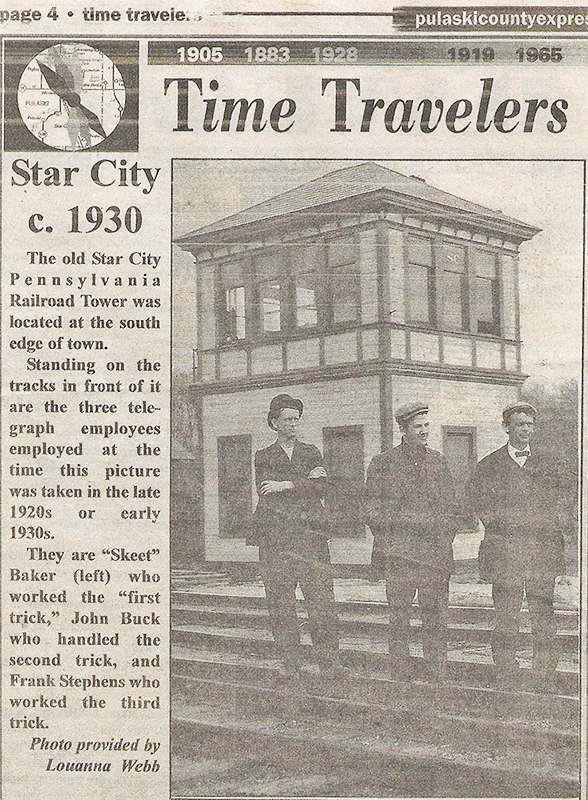 This little town of Star City, population 500, was surrounded by farmland with a skyline of beautiful woods. The streets were lined with maple trees, a sanctuary for all kinds of birds and squirrels. One day we sat on the porch and watched the flickers build their nest by shelling out the inside of a dead limb. Such cooperation! The father bird kept watch all during the nesting season and would come and call when it was time for the mother bird to go for food. He would take over while she was gone. One da,y two little squirrels were chasing each other up and down and around the trees, but when they reached the tree where the flicker next was, the father bird was right there to chase them away.
This little town of Star City, population 500, was surrounded by farmland with a skyline of beautiful woods. The streets were lined with maple trees, a sanctuary for all kinds of birds and squirrels. One day we sat on the porch and watched the flickers build their nest by shelling out the inside of a dead limb. Such cooperation! The father bird kept watch all during the nesting season and would come and call when it was time for the mother bird to go for food. He would take over while she was gone. One da,y two little squirrels were chasing each other up and down and around the trees, but when they reached the tree where the flicker next was, the father bird was right there to chase them away.
There is no show comparable to watching nature create a new life in the country after everything has been resting for several months. A little Jenny Wren ha built her nest in the lilac tree. One day we noticed her running down the trunk of the tree, flapping her wings and chattering as she went. On investigation we found a string of ants going up the tree and she seemed to be afraid they would get in her nest. We took care of the ants and Jenny sang a little song and went back to her next.
The whole community was like one big family, each one’s sorrows and everyone’s joys were shared by all. There was a drug store, a couple of grocery and dry goods stores, post office, barber shop, hardware store, grain elevator, railway station, hotel, and two saloons. And let me say, if any woman went into the saloon, except to get her husband, she was not considered worthy to be recognized. (Today we have hundreds of them selling liquor and don’t seem to think there is anything wrong with it.) There were also two churches and most everyone went to church and Sunday school. It was just as much a part of our life as going to public school, but today there are so many things to detract from one of the greatest privileges of all, the freedom of worship.
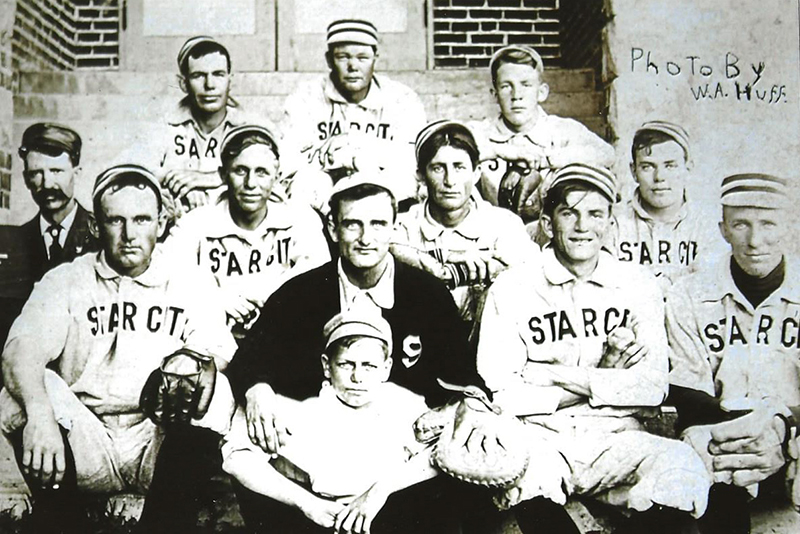 We learned early in life that what counted most was not what we take with us when we go, but how much service and love have we left behind to live in the lives of others. That is our spiritual inheritance that cannot be taken away. Our church was very plain with one long room, straight back seats, two large barrel shaped stoves, one on each center side of the church. In cold weather if you sat near the stoves you roasted, and a few feet away you would be cold.
We learned early in life that what counted most was not what we take with us when we go, but how much service and love have we left behind to live in the lives of others. That is our spiritual inheritance that cannot be taken away. Our church was very plain with one long room, straight back seats, two large barrel shaped stoves, one on each center side of the church. In cold weather if you sat near the stoves you roasted, and a few feet away you would be cold.
Our little town never had streetlights. What a joy to be able to walk in the moonlight and see the brightness of the stars. That is a privilege folks don’t have where there are so many artificial lights.
We had to make our own good times, as there weren’t shows to go to. Sometimes, a traveling troop or a medicine show that had just one medicine that was supposed to be good for everything would come by. Sometimes we would have a box social put on by the school or church. In summer, we had so many picnics in the woods or at the Tippecanoe River, which was nearby. We would go fishing or for a swim. There were cabins along the river where we could go and stay for several days. Sometimes we took a boat ride or had a wiener roast in the woods. They were very happy days to remember.
When my sister and I were quite small, we loved to go with father when he went to the country, especially when he went to Pulaski, a little inland town. They had a large gristmill, which was run by the power from the dam built in the Tippecanoe River. It was quite a sight and when the water was high, we could hear the roar of the dam for a couple of miles. The farmers brought their grain to this mill to be ground into flour and feed.
The Children of Our Family
My older brother, George, was kicked by a horse when he was a small child. It left a small dent in the side of his head, and when he got sick, just a little temperature caused him to be out of his head. Sometimes we four older children would all be sick. Then we were kept in a bed that was made by opening the couch in the living room, instead of going upstairs. Della and I would be at the head of the bed, while George and Billie were at the foot. We always knew George would put on a show. He seemed to think someone was after him and would get up and run around the room. One night he sat up and pounded the pillow on each side of Billie’s head, but never hit Billie. Della would usually cry, but I saw the funny side of it. Of course, it always took father to quiet him. Another night, Mother called to Father and said, “George has gone outside.” Father jumped up and started after him, just in his nightclothes, but did grab his hat and put it on. When he caught up with George he had gone about a block away and was pounding on a door, calling for his schoolbooks.
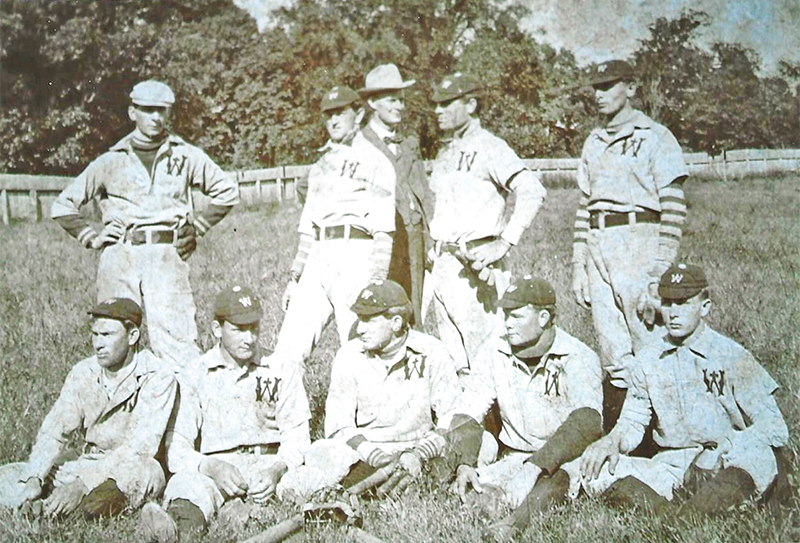 One time, Cousin Burrell was visiting us. We were all barefooted and were playing games out in the yard. Burell was such a clown, he picked up an old rubber boot, put it on, and started dancing around and screaming, asking first one then the other to take it off. We thought he was just acting, so we all joined in the dance with him. Finally he grew pale and fell over, so one of the boys pulled off the boot and out ran two mice!
One time, Cousin Burrell was visiting us. We were all barefooted and were playing games out in the yard. Burell was such a clown, he picked up an old rubber boot, put it on, and started dancing around and screaming, asking first one then the other to take it off. We thought he was just acting, so we all joined in the dance with him. Finally he grew pale and fell over, so one of the boys pulled off the boot and out ran two mice!
There was a family lived near us that had just one boy. He would get so lonesome, so the boys invited him to spend the night with them. The boy came, thinking it would be quite a treat. The boys gave him the full course of treatment in getting ready for bed with several in one bed, and it went on far into the night. As soon as morning came, the boy went home, all tuckered out, and said to his mother, “Well, if we had as many kids as the Stephens, I would want to die!”
I remember a very kindhearted lady that didn’t have any children. She owned quite a lot of property and prided herself on keeping a nice yard with many pretty shrubs and flowers. When she found the dandelions and other weeds getting the best of the lawn, she would invite any children that wanted to come to dig out the weeds. We had to get the roots and she paid us two cents a root. We not only had fun, but that little money meant much to us. I remember when she died (of cancer). At the time there were no mortuaries, and the bodies were laid out in the parlor, a room that was seldom used, only for funerals, weddings, or some special occasion. The body was laid out on a board or table-like affair with a black canopy draped over the framework to cover the body. Someone always sat up with the body. This was called a “wake.”
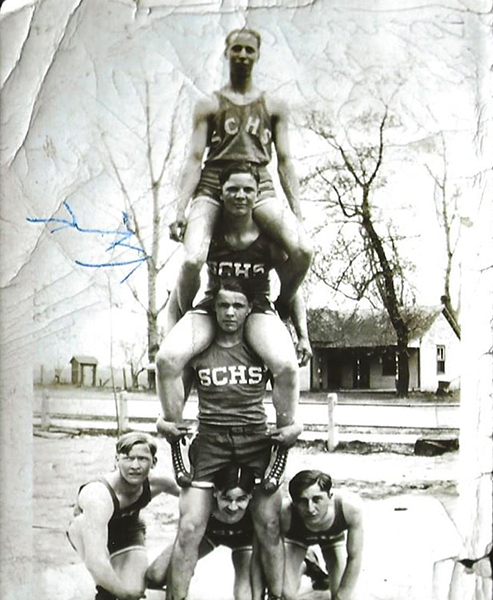 I was only sixteen at the time, but another girl and I went to sit up. We had such a night. It was bitter cold, and we had to keep our feet up on the chairs to keep warm, as the room where the body lay had all the windows upon so as to freeze the body, as they didn’t embalm in those days. The wind blew, making so many funny noises, and the cats fought around the house. We were afraid the cats would get in through the screen, so when we would hear a funny noise coming from that room we had to go in and see if everything was all right. I was a little braver than the other girl, so I had to carry the little coal oil lamp and go in first. We finally decided it was the board she was laying on that was popping because it was so cold.
I was only sixteen at the time, but another girl and I went to sit up. We had such a night. It was bitter cold, and we had to keep our feet up on the chairs to keep warm, as the room where the body lay had all the windows upon so as to freeze the body, as they didn’t embalm in those days. The wind blew, making so many funny noises, and the cats fought around the house. We were afraid the cats would get in through the screen, so when we would hear a funny noise coming from that room we had to go in and see if everything was all right. I was a little braver than the other girl, so I had to carry the little coal oil lamp and go in first. We finally decided it was the board she was laying on that was popping because it was so cold.
Our Home
Our home for many years was a two-story frame house, four rooms downstairs and four upstairs. It was furnished very plain. All of the carpets were hand woven. All winter long we sewed carpet rags and wound them into balls. When spring came, the carpets were put together by an elderly lady, who had a loom and made her living that way. The new carpet was put in the parlor. There wasn’t much left of the one we had wintered on, but it was ripped up, washed and used for other rooms. We didn’t have mattresses, just straw ticks that were filled twice a year. Then we had feather beds on top of them, and when they were first filled, we would need a stepladder to get in bed. How hard our mother worked – no washing machine or any modern conveniences. It took all day to wash since the water had to be brought in from the pump outside. In real cold weather we had to use hot water to thaw the pump, as it would be frozen solid. Then the water was heated in a large boiler and broke with lye to make it soft enough to make suds. We also made our own soap by saving the fat and using lye.
My mother never knew how many she would have to feed, as father wouldn’t come to a meal without inviting anyone who happened to be in the office when he was ready for his dinner. We children could have all the company and parties we wanted. We loved to dress up. There were so many old clothes left in the old house we moved into, old fashioned dresses, bustles, hoops, and hats. We sure had fun with them. Our home was the meeting place for young people. If we were going to the country for a hayride or in the winter for a bobsled ride, they were all invited.
I remember one time we were having a party at our home and were playing “Mrs. Brown Bought A Hen the Other Day.” We formed a circle with the chairs and as we were seated one would start by saying, “Mrs. Brown bought a hen the other day,” and the other would say, “Did she cackle?” This was repeated to the next one, but each time it had to come back to the one who had started to see if she had cackled. Grandfather was sitting in the corner of the room trying to read. When we were about halfway around, he jumped up, slammed down his paper and said, “The hell she did!” and went to bed.
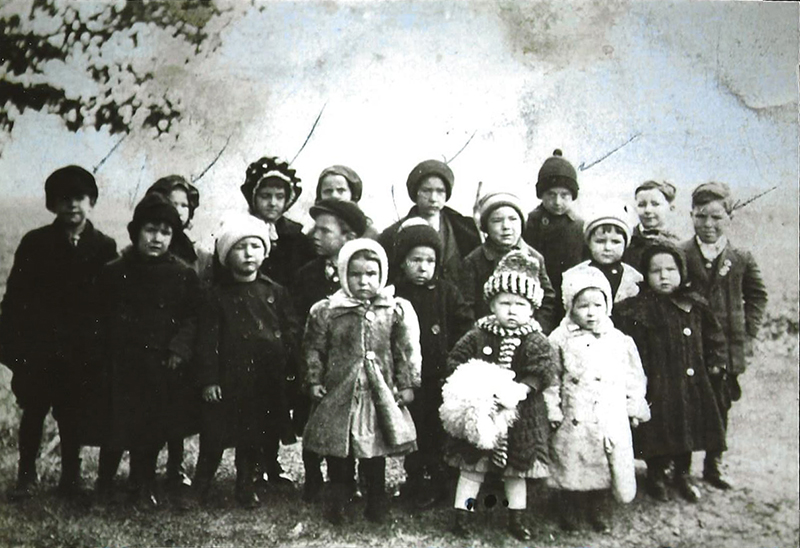 Our schoolhouse was out at the edge of town and in the winter it was hard to get there, as we had to walk the railroad tracks or through a very low place where the snow always drifted. I have gone many a day when I couldn’t tell if I had any fingers or toes, I was so cold. I remember one time the drifts were frozen and we could walk on top of them as high as the fences. Father would sometimes take us in the sleigh. We loved to hear the sleigh bells. In fact, we had many pretty bells – the church bells and the school bells. There was quite a large schoolyard where we played all kinds of games such as “Black Man” and “Whip Cracker,” and woe be to the one who was end man. We also played “Long John,” something like baseball.
Our schoolhouse was out at the edge of town and in the winter it was hard to get there, as we had to walk the railroad tracks or through a very low place where the snow always drifted. I have gone many a day when I couldn’t tell if I had any fingers or toes, I was so cold. I remember one time the drifts were frozen and we could walk on top of them as high as the fences. Father would sometimes take us in the sleigh. We loved to hear the sleigh bells. In fact, we had many pretty bells – the church bells and the school bells. There was quite a large schoolyard where we played all kinds of games such as “Black Man” and “Whip Cracker,” and woe be to the one who was end man. We also played “Long John,” something like baseball.
We didn’t have pencils and pads, but slates and slate pencils when I started school. There was always a bucket of water with a long-handled dipper that we all used. Of course, those were the days before microbes! There was usually a summer school of about six weeks and the teacher was usually some girl that didn’t have much control over the boys. I remember one day my brother George got so unruly the teacher put him out and locked the door. He knew he didn’t dare go home, so he walked around the building, and we would see the top of his red head as he went by the windows. I’m sure we didn’t learn much, but father seemed to think it kept us out of mischief.
As the boys grew up, they were full of pep and lived an outdoor life with their games. I remember one day that it was raining so hard they were playing in the house and got to chasing one another around the room. Grandfather was sitting in a high-backed rocking chair in front of the stove. Around the stove they went and caught their feet in the chair rocker. Over went the chair, Grandfather and all! The boys went in all directions out of the reach of his cane. Grandfather oftentimes tried to correct us and would say, “You children better mend your ways. Your father’s going to turn over a new leaf. He told me so today.”
As we grew up some of our happiest times were around the dining table. We had good plain food, always plenty of eggs and milk. Everyone worked hard enough that we didn’t have to be coaxed to eat and there was always plenty of jokes and fun. If two or three of the boys would come in at a time when we girls were helping mother prepare the meal one of them would call out “Swing” and each one would grab one of us and dance all over the kitchen and dining room. They didn’t realize their strength and usually hurt someone or broke something before they stopped. One evening I was scolding them for being so rough and they said “Outdoors you go.” They grabbed me and let me fall across the back of a chair and knocked me out for a little while, or at least I made them think so. That settled them for a while.
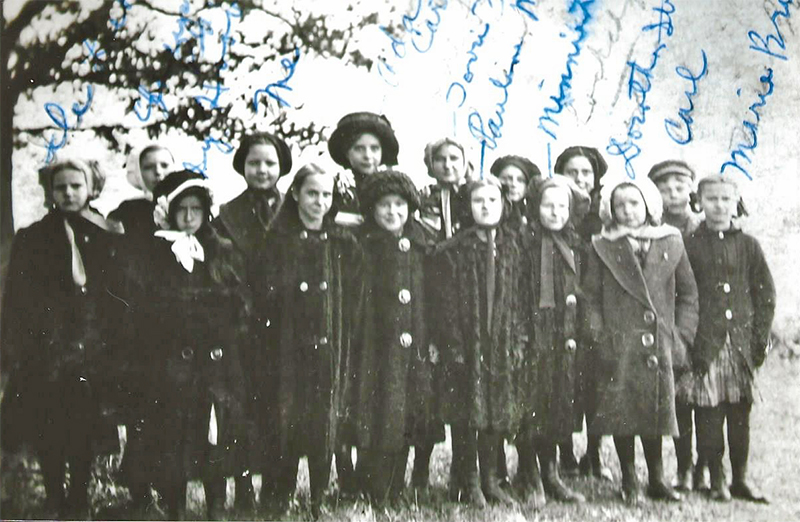 We not only had good food, but plenty of warm clothing; long heavy underwear, sometimes part wool. Father always advised red flannels for little children with chest colds. We also wore heavy stockings, wool petticoats, sometimes two or three, and wool dresses in the winter. We also wore heavy-stayed corsets laced tight so as to have a small waistline, and heavy overshoes, coats and hoods. I wonder how people keep from freezing now in the cold climates with such scanty dress. As young ladies, we wore so many pads in our hair or wire cap-shape affairs we combed our hair over. One morning when we got up the boys had taken these pads and had them hanging between the doors filled with straw, like birds’ nests.
We not only had good food, but plenty of warm clothing; long heavy underwear, sometimes part wool. Father always advised red flannels for little children with chest colds. We also wore heavy stockings, wool petticoats, sometimes two or three, and wool dresses in the winter. We also wore heavy-stayed corsets laced tight so as to have a small waistline, and heavy overshoes, coats and hoods. I wonder how people keep from freezing now in the cold climates with such scanty dress. As young ladies, we wore so many pads in our hair or wire cap-shape affairs we combed our hair over. One morning when we got up the boys had taken these pads and had them hanging between the doors filled with straw, like birds’ nests.
One day my brother Bill came in and asked me to tie a string around a bandage that was supposed to be on a sore finger. When I took hold of the string I was left with the bandage and he said, “April Fool!” but I said, “Oh, that’s just borrowed.” Mother had made apple pie for lunch so I took his piece and filled it with cotton. When he cut into the cotton and started pulling I returned the “April Fool!” and we all had a good laugh.
Father kept very fine horses and liked to race them. He would buy a new horse, much to our sorrow, for that meant we couldn’t have other things we needed, but he would say “This is the best horse I ever had. He’ll make us a fortune. Just stay with me and we will soon be riding around in a palace car.” But it seemed something always happened and the dream never came true. However, I am sure that recreation helped him to carry on his noble work.
Fire Follows Us
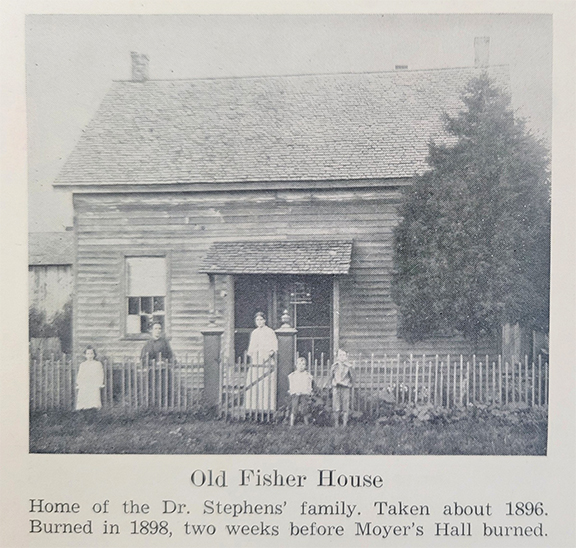
One day mother and I were washing, and she said, “I believe the house is on fire,” and as we stopped out, we could see the flames. She said for me to run down the alley and call “fire,” but I didn’t go very far till I thought I had better go back and get my own clothes out. Mother went upstairs and threw feather beds, clothing and what she could out of the windows. I grabbed an armload of clothing and ran down the stairs, and at the foot of the stairs sat the parrot, “Robbie,” calling “Fire! Fire!” as loud as he could! I grabbed him and ran across the street and sat down and cried. There was enough help to get everything out downstairs, but the house burned to the ground, as we had no protection except the bucket brigade. There weren’t any empty houses in town, so most of our furniture was stored in a hall over a grocery and drug store. Just two weeks later fire broke out in the drug store and five buildings burned that time, our furniture and also father’s office. It seemed that fire was after us, as a few years later another big fire took the life of our mother. She had rung the church bell, which pumped her heart full of blood. The walls of her heart were thin and that and the excitement caused instant death.
One New Year’s Eve, we were having a watch party and decided to ring the church bells to ring out the old year and ring in the new. Some of the older folks were awakened by the ringing of the bells. Thinking there was another fire, they jumped up; half dressed, they grabbed their buckets and started running down the street in search of the fire. When they found out it was just the young people celebrating, they swore they would never help with another fire.
Pets
We had all kinds of pets: birds, parrots, cats, dogs, turtles, frogs and a monkey. One day while going upstairs to my room I heard little kittens and found old mother “Feenie” with a new family of babies in my hat box. I remember a big Shepherd dog called “Old Watch.” He seemed to belong to all the boys in town but stayed around the hotel where he was fed well. He would go with any of the boys hunting. One day brother Ab came in from a hunting trip with Watch and father said, “Ab, why do you go hunting with that old dog? He couldn’t catch a rabbit if he did see one.” And Ab said, “Yes he could. He almost got one today, but the rabbit ran in a hole!”
We had a big Maltese cat at the store by the name of “Old Tom.” He was a very valuable cat. We kept him in the back room at night to kill the rats. We fed him raw eggs and his coat just shone. He would sit at the outside door and wait for someone to come along the street and he would look up and say “Yeow.” They would say, “Do you want in, Tom?” and he would reply, “Yeow.” One day I was in the store alone when someone let him in, so I hid, but he started calling and came right back of the counter where I was, then jumped upon the counter to be fed. I would say, “Tom, if you want an egg you get down on the floor and roll over.” This he did several times and then was rewarded by an egg.
We had a lot of fun with “Harry” the monkey, but he was quite vicious if he thought anyone was afraid of him. One evening he got loose and went downtown. Most of the store doors were closed, but he found one that was open, the pool hall and card room. There were four men sitting at the table playing cards. No one knew that Harry was there until he jumped onto the table. The men were so frightened they upset chairs, table and everything else getting out. The manager said, “Give him some peanuts, boys,” and then called my brother. When he got there, Harry was sitting on the counter eating peanuts.
We had to keep him chained. He had a heavy leather band around his body with the chain attached. When he walked, he picked the chain up and carried it like a woman would carry a long dress. He was very smart and knew the difference between a match and a stick. He would always strike the match, and one day he set his box afire! How he did scream until someone came to put the fire out. Another day he saw a honeybee on a dandelion blossom. He slipped up very carefully and grabbed the bee and got stung. He climbed up in the tree and picked at the stinger and cried just like a child.
One time there was a big homecoming, and the children had a pet parade. There were all kinds of pets: dogs, cats, and goats. One little girl had a dog she called Ringo. She would dress him up in her doll clothes, even with a bonnet, and set him on her tricycle seat and pull him down the street. So, she entered him in the parade. One little boy had a pet pig. During the parade the pig got too close to Ringo and he jumped down and chased the pig, his dress and bonnet flying in the air. Just the same, Ringo got the prize.
Our First Car
There came a time when it was necessary for father to have a car, so he bought a small Ford. The boys tried to teach him to drive it, but he was never able to master the art, although he could drive the wildest of horses. Father’s youngest brother, Uncle George, had come to live with us as he was all alone in the world, so the boys taught him to drive. One day they drove out for dinner, as we lived at the edge of town, but other work took the driver of the day, so father had to drive back to town. Edna had to ride back with him, as she worked in the post office. They started out and he went so fast that when they came to a corner, they went around on two wheels. In town there were four railroad tracks, and over these they went just bounding. Then after a short turn they arrived a few feet from the office where he clamped on the brakes and stopped. It took them up in the air and almost out over the windshield. He said to Edna, “How’s that for a ride?” and Edna said, “I’ll never ride with you driving again,” and she never did. Edna learned to do the driving herself.
I’ll never forget our last Christmas together before our mother passed away. I was working at South Bend and living with Brother Billie and his wife, Jess. We were going home for Christmas and Billie said, “Do you think we could arrange it so Bertha and family could be with us?” Bertha was Jessie’s only sister, and it was their first Christmas since the passing of their father, and of course, Jess wanted to be with her also. I said, “If mother knew she was to have that many and no one to help her with the preparing, it would make her sick,” and he said, “I guess you are right.” We went home on Christmas Eve and Billie and Jess spent the night with Bertha and her family. My sister came in with her five children to spend the night at home, so we waited until everyone was home to have our presents around the tree.
Father never left his office till nine or ten at night. I can just see him now, sitting in the big chair with the three smallest children in his lap, and the two older girls distributing the gifts. Father always thought things like that were silly for grownups, and he kept smiling and saying, “Now isn’t this silly,” but from the glow on his face I am sure no one there enjoyed the evening more than he.
The next morning, we were hustling around getting things ready for our dinner. Of course, mother had prepared a turkey with all the trimmings, and we girls took over as Sister Della had brought young grouse to fry and many other foods from the farm: pure whipped cream, canned peaches, a big cake, etc. I was called to the phone. It was Bertha and she said, “Do you think it would bother your mother if we brought our dinner, all prepared, and came out?” I said, “No, I’m sure it wouldn’t, as we girls are here to help.” So, we just set up another table.
Father had built this large eight-room house out at the edge of town. It was a beautiful place on the side of a hill with an oak grove in the background. So, in due time, they all arrived. I remember Ab rode out with them. He got out of the car with the turkey in a roaster and ran up in the edge of the woods and sat down like he was going to eat it. It was snowing, big white flakes, which added to the warmth and glow on the inside. There were around thirty in all, and such a dinner. Two complete turkey dinners and the extra Della had brought. It was a Christmas never to be forgotten.
As we grew up and were all making our own money, instead of each buying our mother a gift, we pooled our money and bought mother something nice for the house. One time, a kitchen range. Other times we gave a library table, sideboard, dining room table, and a set of dishes. She was always so overcome, and it was hard for her to express her thoughts. She would say, “I am afraid you children will think I don’t appreciate this gift, as I don’t know what to say to express my thanks.” But with the love that shone from her big blue eyes, she told the story better than it could be expressed. Mother always accepted life just as it came, without any fuss or complaint. She was not at all emotional and never showed any anger, regardless of disappointments or hardships. Her life was a life of simplicity, accepting each problem without any complaint, however hard or unjust it might be. Mother’s devotion to all that was good was an inspiration to all those who knew her. She never neglected her family or home in any way. We always had good nourishing food, plenty of fresh milk and eggs. We weren’t so fond of all the sorghum molasses we had to eat but realize now it was a great factor in building strong bodies. People nowadays buy it for the vitamin B it contains. We all grew to maturity, the youngest brother, Ab, going first. (Ab was a Captain with the Long Beach, California Fire Department.) He was taken at the age of 42 in the Long Beach earthquake of 1933.
While we were living on ten acres out at the edge of town, someone had given father some long-nosed, razor-backed pigs in payment for a doctor’s bill. They were so wild and were always getting out of their pen. One day, father and Ab came home to dinner and found the pigs running loose. They tried to chase them back into the pen, but instead they ran up the hill into the woods, then down through the meadow, with father and Ab after them. This was repeated so many times that the men folks were worn out. Ab would get near them and father would yell, “Fall on them, Ab, fall on them!” He would make a grab, but it was just like trying to catch a greased pig. Father couldn’t run any more, but stood by with a club and threw it at them every time they passed, which of course made them run faster. This went on for so long without any success that we were getting alarmed and were afraid that father would keel over. I went out on the porch and called to them and said, “What are you fellows trying to do, kill yourselves?” Father, with his club still raised in his hand ready for the next blow, said, “My God! Can’t you see we are trying to catch these pigs?” They finally found out the pigs had more endurance, so finally they had to give up but left the pen open with plenty of corn in full view. In time, the pigs went in of their own accord. I was glad I wasn’t too near, or I might have got the club instead of the pigs.
Father had a wonderful philosophy of life. He wanted us to be self-reliant, but not to the extent of leaving home. He would say, “Show me the fellow that never made a mistake and I’ll show you the fellow that never did anything, but you don’t have to make the same mistake twice.” And he would say, “When you get out in the world and take a few hard knocks, that is what will make you strong,” or, “You can’t live a life to yourself and be a success.” He would also say, “He who serves best gets the most out of life, and remember, no one is going to give you something for nothing. The things you really earn are the things that count for most.” And I remember this saying, “If happiness you would win, share it; happiness was born a twin.”
There are so many wonderful lessons to be learned if we watch plant life. The harder the storm the deeper the trees plant their roots. In watching the mother bird, if the babies don’t leave the nest when she thinks they should, she pushes them out, but stays close by to teach and protect them. The same thing is true in life. Give children the necessary responsibility but stand by to help if needed.
Father not only gave of his service and medicine, but he gave of himself. When he knew people couldn’t pay he went just the same, even if he wasn’t well himself. The last call he made was to see a sick child. He got up out of a sick bed and even though we tried to get him not to go, he said the child needed him. He took more cold, causing pneumonia, and he passed away in a few days. The minister who preached his funeral said, “While we preachers were in the pulpit preaching the gospel, Dr. Stephens was out putting it into practice.
Grandma McFadden Remembers
Mary Kathryn Strong McFadden
When I was about three years old, we lived several miles east of Star City. People didn’t get to town very often. There was a huckster wagon that came once a week. He sold garden seeds in the Spring, along with flour, sugar, cornmeal, raisins, prunes, dried fruits, spices, salt, pepper, extracts, needles, straight pins, safety pins and also yards of material to make clothing. He also sold coal oil for lamps and lanterns. He sold shoestrings, liniment for sore muscles and salves for cuts and infections.
The first Christmas I recall was in the “Heward” house in Star City. Mamie was a baby. Dorotha and I got brass doll beds and dolls with china heads, hands and feet. The dolls had blue eyes. One was black-haired and one was blond. We also got celluloid balls. Celluloid was a forerunner of plastic. One ball was pink and one was blue.
The “Heward” house had etched or frosted glass windows in the front and back doors. This door glass was etched or frosted to create beautiful scenes. From the “Heward” house we moved to a house in the south part of town.
Our dad worked at the livery stable where they rented horses and buggies. He also worked as a drayman, hauling freight from the Pennsylvania Railroad depot to the stores and businesses.
I was reminded a few weeks ago (1991) of a special time the kids enjoyed at Sunday School. I saw a commercial showing a display of old iron banks. The one we had at Sunday School was an American Bald Eagle, bronze in color, with its white head. We put our pennies into the big eagle’s beak and tripped a lever. The eagle bent over and put the penny in a baby eaglet’s mouth. The eaglet swallowed the penny, which fell into the bank below. What fun!
Our next move was to the “old” farm. We rented and share cropped. The owner, a woman, lived in Illinois. We had a fenced yard with big trees. Dad put a rope swing in the backyard for us. There were five rooms, three downstairs and two bedrooms upstairs. We used fresh straw to fill our straw mattresses when the threshing was done in the summer. We loved the fresh smell and the straw made our beds much higher.
I remember we had a small chest of drawers on a back porch. Our well and pump were on the porch so three sides were boarded up for protection from the weather. I can see this chest of drawers which contained many different things. On the top was a quart jar filled with water to which walnut hulls had been added. Our mother wore a “switch” on her head. It was made of her own hair. It was put in this jar to keep it the right color. It was made into a roll or bun and pinned on top of her head or at the nape of her neck.
There was a dry basement where home canned fruit, sauerkraut, and other stuff was stored for winter. Dad dug a hole in the garden and filled it with straw, where he stored potatoes, apples and cabbages. It was closed with straw and dirt to make a mound. We had lots of company on Sunday in the summer and fall. We raised good watermelons and cantaloupe, which were shared. Dad would bring melons in from the field on a hay wagon, where they were cut and enjoyed by all.
One day we were playing upstairs, running through the two rooms. One room had a window on the far side. Gale ran into the window, pushed the screen out, and fell two stories. He fell on top of the screen, no broken bones and no ill effect. All were scared to death.
As we got older, we girls teased him a lot. He was our only brother. Our baby brother Max died about 16 days after birth. Gale died at the age of 21 of peritonitis. He left a wife of less than a year. She was Faye Fisher.
The first year that I went to school (1908), I stayed all week with Grandpa and Grandma in town. The second year, Dorotha was old enough to go, so we drove alone with horse and buggy. We left the horse at one of Star City’s three livery stables, where a man named Erastus Crow took care of it through the day. We helped with milking in the evening. Automobiles were very scarce in those times. We went to visit friends and relatives in a two-seated surrey with a team of horses. The horses were afraid of cars, so when we saw one coming, we had to pull into someone’s field until it passed by.
One afternoon in a week or two, Mom took us kids and her mending and we visited our neighbors. We kids played while our moms did sewing or mending. The next week, a neighbor came to our house.
The lady who owned the farm sold it and Dad bought the “Carey” farm about a mile west of Star City. I was a freshman in high school. We walked to school. I played basketball (outside court) and was on the debating team.
World War I was in progress. Lots of troop trains went through Star City with whistles blowing. The soldiers would throw their names and addresses out the windows. I wrote to a soldier by the name of Leslie Stephens who went overseas and then he came back to his home in Froid (?), Montana. I had three uncles overseas. Two of them were single, so they called our house home. Uncle George brought bed bugs home in his belongings. My mom cried. Her health was bad and she couldn’t take on any extra work. She told us girls to go up, close the bedroom door, open the windows and throw all bedding, curtains and mattress out, and begin cleaning. It took a week. We cleaned the mattress twice a day with bug killer.
Funny things happened or at least they were funny at the time. one time, Mom wanted to paper the kitchen. The ceilings were very high in all the old homes, so she had us girls get up on the kitchen table with brooms to get the paper up to the ceiling. It didn’t work so she hired two women, Becky Reynolds and Alice Rinehart, who did that work to come and paper. We had many a good laugh over that.
Needless to say, people have flies if they live on a farm. Mom would give us dish towels about a yard square. We would start at one side of the kitchen, shaking and swinging those towels, driving the flies to the door on the other side of the room where one person stood waiting to open the door to let the flies out. It worked very well, however, one day we had a big fly that didn’t cooperate. He flew around and around and landed on the window pane. Mom said, “I bet you I’ll get him,” and she grabbed the broom, swung at the fly, and broke the window glass into a million pieces. We kidded her for years about that!
Mom had been ailing all her life as we kids knew her. She doctored with a doctor from Winamac who had been recommended by Dr. Stephens, her father. Finally, they decided on an operation to save her life. She went to Indianapolis. Dad went with her and stayed two or three days. We kids were alone except at night when Aunt Edna stayed with us.
My Dad died at the age of 48, Mom at 83. Mom and Dad came to our house for Christmas. He became ill and died at the hospital in Gary after an operation due to cancer of the pancreas. Mom died at Dorotha’s home, of heart failure.
Our Dad was one to help people if he could. He seemed to take a liking to older people. He called several of our older neighbor men “Dad.” It was a word showing respect. One summer day a gray haired chubby old man stopped at our house at noon. I can see him to this day. He was clean-looking, wore strap overalls and had a smile. He asked Dad if he could have something to eat. He said he had a quarter to pay for it. Dad told him we were just ready to eat and come on in. He said he would eat on the porch and thanked Dad for asking him to join us. we kids had that quarter spent to buy chewing gum, but Dad gave the quarter back and the man ate and walked on his way. He was called “Dad” by our father.
Another time, dark at night and in a bad blizzard, a man with a horse and buggy saw our light and came to the door. He asked Dad if he could put his horse in the barn until morning. So Dad did and told the man to bring his blankets and sleep by our big heating stove, which he did. We had two bedrooms upstairs which we used. After we got upstairs, Mom said, “Roll, you will get us all killed!” He told her the man couldn’t see in the blizzard and would freeze. The man left the next morning after giving us some sheet music he had written. He lived in that buggy. There were pans, a skillet, spoons and cups hanging from the top of the buggy.
Gypsies came two or three times during the summer. They travelled in covered wagons. Sometimes there were three or four wagons. The wagons were pulled by two horses. They also had an extra horse tied to the back of each wagon. At night the horses were tied to a stake so they could eat grass. They put hobbles on their legs near the ankles so the horses couldn’t get away. These people wore very colorful clothing, lots of jewelry, very large earrings. Even the men wore heavy jewelry. They were bronze-skinned with very black hair and eyes. They always had several children in each wagon. They begged and stole what they needed. Most people were afraid of them. One time my mother answered the door, a gypsy lady asked for a “cheekin.” She said her child was sick and she wanted to make “cheekin soup.” Mom said No and the gypsy walked off the porch saying, “You are stingy.” We could see them coming two miles away. Mom made us get under the bed!
We made our clothing. Underwear and slips were made from flour sacks, dresses were made from material from the store or from dresses given to us by our aunts. The material was always washed and pressed and soon we had a new dress from a hand-me-down.
During World War I we helped in the fields because men had gone to war or worked in industry pertaining to war. Neighbors shared the work, helping farmers with crops. We raised or grew our food. One winter about 1919 we had a bad snow storm. The roads were closed – you could barely see the tops of fence posts. Our cattle were in a corn field about ¼ mile from the barn. Dad and others shoveled a path wide enough to bring the cattle to the barn. They also opened the road to town enough for one buggy to get through. After a half mile, they shoveled a “siding.” If you saw a buggy coming, you pulled into this siding and gave the other person a chance to go by. Our neighbor Mr. Tack would always say, “I’ve haft to get on the switch.” He was a very short heavy-set man and we always got such a kick hearing him say that. And we used it in many situations afterward and laughed at his humor. During that snowstorm we walked right over the fences to get to school.
At Grandma and Grandpa’s House
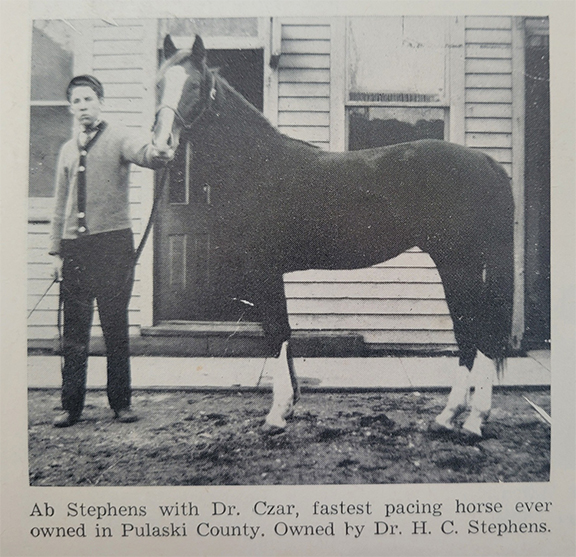
I loved to visit at Grandma and Grandpa’s house. Grandpa was a family doctor for people in Star City and for miles around. He was a very caring person. His home was full to overflowing with four grown children still at home. His brother, great uncle George Stephens, was keeper and trainer of the horses, three race horses, Dr. Czar, Sonny, and Gold Heart, and a horse to pull the buggy in the summer and the sleigh in the winter. In the winter the horse wore a leather strap with sleigh bells. In the sleigh was a foot warmer and a black bear fur lap robe. The foot warmer was a rectangular metal box covered with carpeting. It had a drawer the full length of it. That was to hold a charcoal brick which was put in the fire of the kitchen stove to get red hot. Tongs were used to lift it into the metal drawer. It kept the feet warm on a frosty night going miles into the country to see the sick.
Grandma was known as Ma Stephens, a fine cook and kind person with the patience of Job. In the spring she kept a jar of sulphur and sorghum molasses, a spring tonic for tired people, and sassafras root tea made from tender roots of the sassafras tree. Grandpa took us kids to all the “dog and pony” shows and we always had a box of cracker jack for a treat. Grandma cared for terminal patients in their home: a woman with cancer, a young man with TB. I remember well. They had cared for their elderly parents before they moved to Star City.
Theirs was a household of fun, good times and laughter. Aunt K. and Aunt E. wore their long hair done up like beehives. Their beehive was made of wire and pinned to the hair and the hair combed smoothly over it (you had to be there!). One morning Uncle Ab took the beehive, filled it with all sorts of stuff and hung it at the top of the door fame. Ceilings were very high in those days, so there it hung, high up in the air. It took awhile for her to find it. Aunt Kate owned her own millinery store in Star City. Her hats were made to please the fancy of the purchaser. We girls all had new spring bonnets made just for us. We loved to go to her shop and pick a hat and all the trimmings.
Uncle Fred was a telegrapher for the Pennsylvania Railroad. The tower was at the edge of Star City. Uncle George was a flagman on freight trains for the same company. He worked out of Logansport, 22 miles away. Both had to use the Morse code. So they put one unit (board) in Grandpa’s home, the other in a room in his office just up the alley. Uncle Ab also was interested in learning to operate the keyboard, so between the three, they did a lot of “dot and dashing.”
One summer, Skeet Baker (another Star City boy who was a telegrapher), asked the boys if they would keep his pet monkey while he was on vacation. The monkey was tied to a tree (very long clothesline) in the backyard. Aunt E. and Aunt K. were afraid of the monkey and he knew it. You could hear them screaming as they went down the path to the outside toilet. The Stephens family also cared for some friend’s parrot one summer.
Grandpa, with Grandma’s help, made the cough syrup he gave to his patients. It was a mild medicine with sugar and water syrup. The monkey got into the shed where the buggy was kept. He found a couple bottles of cough syrup in the buggy and drank it. As I said, it was mild so there were no ill effects to the monkey. He also found several small cans of paint, opened them, and when they found him, he had several colors of paint on his fingers, trying to pick it off.
Grandma played Flinch, Old Maid and Dominos with Dorotha and I. She would be so tired from working all day, so when she had to give up, she would laugh and pick up the board from underneath and say, “That’s all!” Cards or dominos would fly and we all had a good laugh.
Grandma died September 15, 1915 after ringing the church bell to summon volunteers to fight the elevator fire that destroyed the building. She walked from the church to the fire and dropped dead of a heart attack. Grandpa died of pneumonia at our house in 1924. Bud was about nine months old. Grandpa had remarried to Nellie Taylor-Biers-Washburn of Crown Point. She was Nellie Becker’s aunt. They were divorced and he was on his way to California. He stopped to see us in Crown Point; Uncle George was with him. They were at our house a few days when Grandpa died of pneumonia. Bud took his first steps the day after Grandpa died.
I Met Pa
After graduation from High School in 1921, I came to C.P. to visit Grandpa and friends, the Taylor family: Nellie Taylor Becker and Aunt Edna who worked at the courthouse. One noon, Nellie asked me to walk to the Post Office with her and she would introduce me to her cousin who lived with the Taylor family and was a motorman on the Gary and South interurban. So I did. He was on the corner of Joliet and Main St., waiting for the street car to come into town from Gary. I knew he was the one for me! He had sorta blondish hair, green-blue eyes, and was clean and neat looking. The next day my Aunt and I went to Gary on his car. The conductor was taking fares and he said to me, “Your fares are paid.” I went home and later on went to Terre Haute IN to teacher’s college for three months. We wrote every day. When I came home, he rented a car and came to see me. Aunt Chloe and Mabel came along one time. I started teaching at a country school near Denham IN. I had 32 pupils in 8 grades. I cleaned the school, built the fire every morning in the big old stove and also carried a bucket of water into the school for drinking. I lived with the trustee and family whose name was Mau. I walked a mile each morning and evening to school and back. I came to Grandpa and Mrs. Stephens for Thanksgiving. We eloped to Valparaiso IN the next day, Nov. 25, 1921, where we were married. Our marriage was printed in the Valparaiso Vidette the following week, so our secret was out. Aunt Edna had known because we asked her to go with us but she wouldn’t. Pa’s sister Kitty Hammer went. We took Aunt Edna and Nellie Becker (Pa’s cousin) with us to the show in Hammond that night.
When school was out, and after much travelling back and forth on the Pennsylvania railroad between Crown Point and Star City, I came to Crown Point in the Spring of 1922. We lived at 147 N. West Street in a cute cottage. All new furniture! We paid $15 a month rent! When we were expecting our first child, Phyllis Jeanne, we moved to 517 N. Main Street to a seven-room house. We paid $25 a month. Aunt Edna moved in with us. Phyllis Jeanne, Bud, Darrell and Mary Alice were born in this house. Doctor Blackstone and Grandpa delivered Phyllis. Doctor Blackstone delivered the other three children. Vernie’s aunt Chloe helped with all four. Pa was good help through the long hours of delivery. He loved the children.
Things I Have Seen
We had two stolen cars in our driveway – one in a rain storm at 517 North Main Street. They got out and ran. The other was at 216 North Sherman Street by the school. The sheriff came for both cars.
I have seen pink snow falling twice, once at 517 North Main Street and once at 307 South Court Street. We had thunder and lightning during a snowstorm. I got such a kick out of the last one. I have a police radio, as you know, and when the pink snow (because of the lightening) came down, a policeman called another and said, “I never saw that before!” I laughed out loud and said, “I have! Twice!”
I saw an albino robin at 504 East Joliet Street. I called Aunt Edna to come out to see it. I also told a carpenter working next door at Beigels to see it. So I had proof. It was seen by a person on South Street also.
We had snow September 25 when we lived at 109 South / East Street, in 1942. Very early for snow. The leaves were still on the trees and it was a sight to see, the tree limbs bending under the weight of that wet snow. We had about two inches but it didn’t last long.
When we lived at 210 South Court Street, I saw the new moon with Venus inside the arc. It was very unusual.
Later, I lived at 207 S. Court. Colonel Sander’s Fried Chicken was robbed at 109 South Main Street. The young man who pushed the alarm button ran out the back door, came to my front door, pounded and said, “Let me in, they are going to kill me!” He was inside my hall; I had heard the call on my radio for police. I told him I wouldn’t let him in, but that I would call the police. He was inside the house, but not in my apartment. He was scared to death. He thought the robbers saw him leave and he knew they had guns. The police came to my door after I called them. They questioned the young man and went with him to the Colonel’s. The hold-up men got away.
Ofttimes, I have seen a vertical rainbow over the football field. It appears to be about 6 feet high, straight up and down, not an arc. My only explanation is that it may be ice crystals with the sun shining through them. I’ve called people to see, I thought they might not believe me!
I’ve seen lightning strike the flagpole on the football field. I also saw a strike come down to the ground in the middle of the football field. Rita was here when the pole was struck, also the mailman was in the hall at the mailboxes. He looked up in time to see the pale smoke come from the pole and both Rita and the mailman could smell the paint.